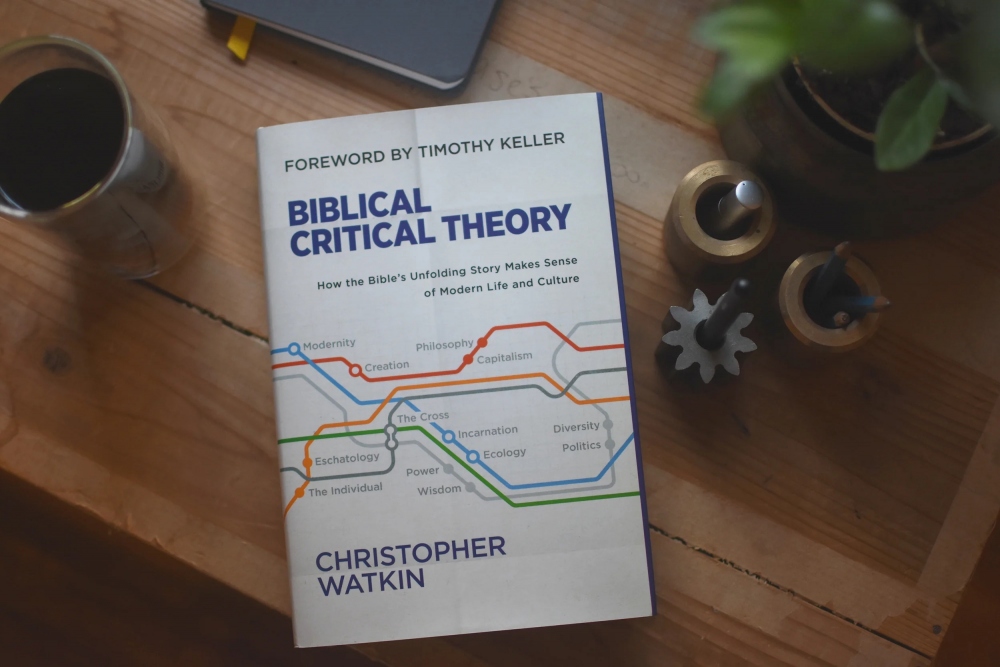It’s going to be a bit difficult for me to restrain my rhetoric as I write about this book. Biblical Critical Theory needed to be written at this moment of history for God’s people to think through and assimilate its message into their minds, hearts, and imaginations. It is erudite, thorough, biblical, and clearly written. It will also take some effort—this is not casual reading—because it is a work of serious theology, philosophy, and apologetics. The effort is worth it, however, because Watkin’s message is so vital. His subtitle says why: “How the Bible’s Unfolding Story Makes Sense of Modern Life and Culture.”
One word of advice right at the beginning. If you start, as you should, with Watkin’s Introduction, and find it difficult going, do not set the book aside. In these 32 pages he sets out some of the philosophical categories, terms, and definitions he will be using in the book. I found the material hard sledding, and after reading it three times am still not certain I have fully absorbed all that Watkin’s intends. I discovered that though the material he so carefully explains in the Introduction is helpful to understand his argument in the book, it is not essential to be conversant in it. The rest of the book is a lovely, thoughtful walk through the story and pages of Scripture to develop the implications of what we believe and how those beliefs have something intelligent and substantial to say to our world of advanced modernity in the 21st century. And as he uses these terms and categories, they begin to make more sense.
Christopher Watkin is associate professor in French studies at Monash University (Australia) who is widely read in Scripture, historic doctrine, and modern thought. One reason I was quickly drawn to Biblical Critical Theory was that I felt so at home with what Dr Watkin is saying. Not only does he take the biblical story seriously, but he also carefully observes what is in the text in order to allow it to respond to the ideas, values, and ideologies of our day. In this Watkin is continuing what Margie and I learned from the teaching of Francis and Edith Schaeffer in L’Abri Fellowship. Biblical Critical Theory is a demonstration of and instruction in thinking Christianly.
In other words, if you are a follower of Jesus, PLEASE READ THIS BOOK. And if you are not a follower but are interested in the implications of the historic Christian faith especially amidst the cacophony of claims appearing on social media, please read this book.
In a Forward, the late Timothy Keller summarizes the significance and substance of Biblical Critical Theory:
Critical theory aims to make visible the deep structures of a culture in order to expose and change them. Chris, as a scholar of modern European thought and languages, is thoroughly acquainted with the various forms of critical theory that have arisen over the past century. Most of them are based directly or indirectly on forms of Marxist analysis. Since the middle of the twentieth century and especially since the 1990s, a host of “high theories” in this tradition—literary theory, feminist theory, critical race theory, queer theory—have sought to unmask and undermine the oppressive structures of Western society.
But the term critical theory has an older and more basic meaning. It means to not just accept what a culture says about itself but also to see what is really going on beneath the surface. Every culture deploys multiple patterns—narratives, pictures and images, vocabulary—to create a “world” (or “worldview” or “social imaginary”). But the Bible has its own narratives, images, and patterns that enable us to analyze any culture at the deepest level and to both critique and appreciate it, while at the same time preventing us from being captured and coopted by it.
A biblical critical theory, therefore, can and should be developed and used by Christians living and ministering anywhere in the world. In must first expose the main flaws in the dominant culture’s narratives, showing how they fit neither human nature nor our most profound intuitions about life—let alone the culture’s moral ideals and aspirations. (As Chris points out, this was the approach Augustine took in the incomparable City of God.) Then Christian theory must point to the beauty and truth of the gospel as the source of numerous fulfilling counternarratives.
The contention of this book is that there is a critical theory in the Bible itself. Chris Watkin travels through the Scripture from start to finish, giving us the outlines of Christian social theory.
I’m especially pleased that Chris, while exhibiting an extraordinary breadth of learning and reading, wrote this book not only for an academic press or audience but also for educated laypersons and Christian leaders…
For the past several years I’ve called for a “Christian High Theory,” and what Chris Watkin is working on in this book is exactly what I had in mind. He prefers to call it a “Biblical Critical Theory,” and he convinces me to adopt his terminology. His reasons for it are good: (1) we should not build our critical theory just from theology in general but in direct contact with the Bible, and (2) our stance toward the culture must take into consideration every major “turn” in biblical redemptive history—not just focusing on one part, which many denominations and Christian traditions tend to do. To use the term biblical helps us keep this goal in mind. [p. xv-xvi]
As I read Watkin’s book, I was reminded of Dorothy Sayer’s insistence that when it comes to the Christian faith, the dogma is the drama. Biblical Critical Theory also reminded me of how profoundly satisfying the message of Scripture is, because it is not limited or tribal or narrow, but expansive and life-giving beyond our wildest imagining. It also reminded me of the power of gospel, a story that addresses the deepest yearnings of the heart, that critiques the incomplete ideologies of a fallen world, and that points to a hope that will not disappoint.
Book recommended: Biblical Critical Theory: How the Bible’s Unfolding Story Makes Sense of Modern Life and Culture by Christopher Watkin (Grand Rapids, MI: Zondervan Academic; 2022) 605 pages + bibliography + indices.
Photo credit: Photo from Westminster Bookstore website



